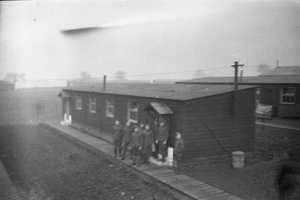[Received December 5, 1917]
Camp Harrowby, Grantham, Eng.
November 13, 1917.
Dear Mother:
My good resolutions to write home daily seem to have gone up in smoke. The training here has been going along steadily from 9 until 6:30 with time out for lunch and TEA. It is rather interesting in a high school sort of a way, but we want to get on with flying.
Today we had the best training we have had here. The afternoon spent on the range. Each of us fired 80 shots. We made up a pool in our squad for each of the two tests and I won the first one, 9 shillings, for getting the best group. I got second in the other test of shooting at four groups of Germans painted on a landscape target. We went thru all the regulation motions of setting the sights on the proper range and the handling of the gun. It was great fun. A machine gunner has to be an automatic, quick and ferocious sort of animal. This camp sends thousands of them to the front most every week. They surely have my respect. The poor dubs [sic] realize that they have about 7 minutes to live after they get their gun firing.
The guns surely are wonderful things for squirting metal hard. I am going to get a Lewis gun to shoot crows and geese with after the war. I took a bunch of pictures today of the gun in action.
Last Sunday morning a mate and I took in the festivities at the cathedral. It happened to be the service for installing the Lord Mayor and his officers in office and was preceded by a procession of dignitaries, police, home guards, boy scouts and a big band up to the edifice
The cathedral is a wonder. I believe it ranks third among those in England. “Stratt” and I climbed away up the spiral stone steps in the steeple—away above the chimes while they were ringing and almost rocking the tremendous steeple with their loud tones—to the rampart just where the pointed part starts. We had a wonderful view of the town and valley all around.
Sunday afternoon, Palmer and I took a bike ride across country to an advanced flying school where we saw some 130 mile an hour scout machines.
Last night was our guests night. We had about 20 British officers to dine and make merry with us. The dinner was a bit elaborate, the regimental band was present and played all evening and the bar was unusually well stocked and patronized. After dinner we had a very hilarious rough house. Foot ball, dancing (no girls), stunts and all sorts of wild goings on. A lot of it was very funny.
I have received three letters since I last wrote, one from Mother, Sept. 24; one from Father, Sept. 30; and Father Oct. 14. They are very newsy and interesting. It seems funny I have not heard from you since my cablegram sent from Oxford. I wrote Knud Sehested a postal from Oxford and have received a letter from him in answer. A good idea will be to number all the home letters consecutively so as we can see if any are left out.
Fifty of us are going to be posted to flying schools next Monday. The selection was made by London and must have been a big lottery. I hope I was one of the fortunate ones. They say the adjutant here has the list, but has not let any one see it yet.
I got an interesting letter from Margaret.
Write me
Parr Hooper
Aviation Corps U.S.A.
In training by R.F.C.
c/o American Embassy, London, Eng
They will forward it to me no matter where I go. R.F.C .= Royal Flying Corps.
Good night.
Lovingly,
Parr

The “cathedral” was actually St. Wulfram’s parish church in Grantham, remarkable for the height of its spire.121
Palmer and Parr may have caught a first glimpse of an S.E.5 (Scout Experimental 5) or an S.E.5a (essentially the same plane with a more powerful engine). With the ability to fly at over 130 mph, the S.E.5a was one of the fastest scout machines of the war.122 There were several R.F.C. and Royal Naval Air Service air fields within biking distance of Grantham, but I haven’t been able to determine which one included the advanced flying school Parr mentions.